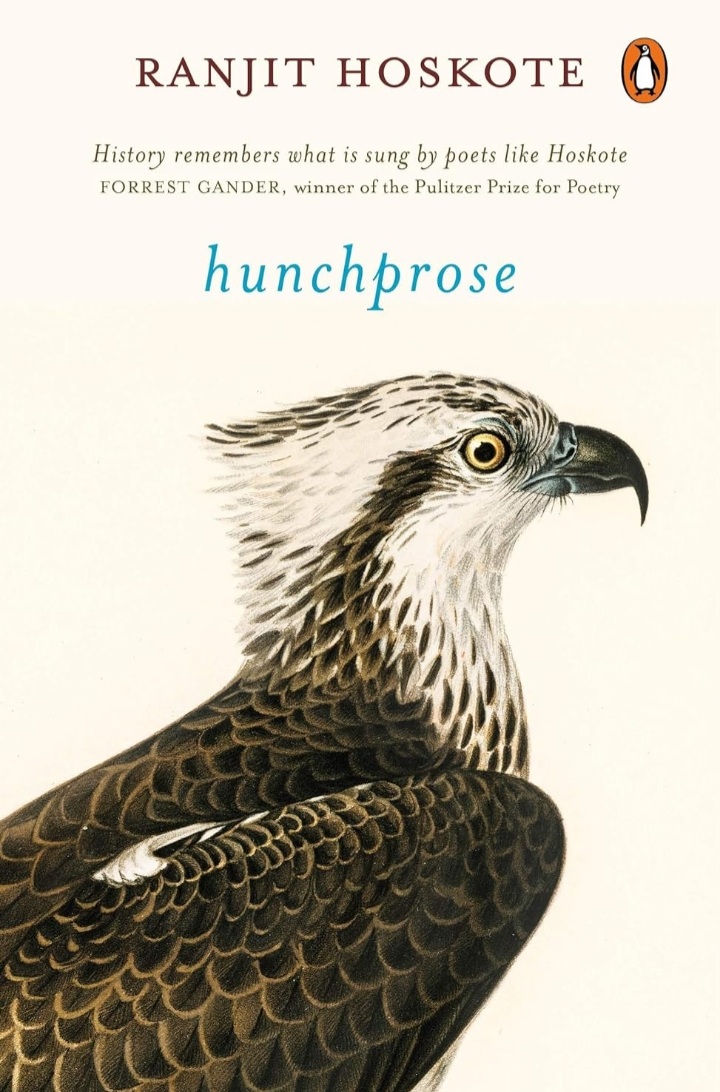REVIEWED BY BISWAJIT GOSWAMI
Manash Firaq Bhattacharjee has opined that Ranjit Hoskote belongs to the poetic tradition of Arthur Rimbaud and Paul Celan. However, a thorough reading of Hoskote’s collection, Hunchprose (2021), reminded me more of T.S Eliot and his tendency to refer to mythologies. Also, his sense of history reminded me of Jibananda Das. Hoskote, in an interview, said that the poems in this collection were written between 2018 and 19. Some of them were published or presented before in some anthologies and magazines. However, the collection was brought out in the catastrophic world of the COVID-19 pandemic and marked its relevance to the contemporary situation. The collection is not based on any particular theme nor does it try to give us any particular message. The poet, on several occasions, have returned back to history as well as to Oriental and Western mythology and legends. Many a time, he has also referred to objects, animals, and creatures whom we often think to be insignificant to mark their role and importance in society and the environment. No wonder some of his poems have also echoed the voice of the subalterns and proletariats scoring their victories and falls, happiness and miseries. It seems like the poet is lost among them, and they are lost within the poet.
The collection begins with a poem, ‘Sidi Mubarak Bombay (1820-1885)’, where the speaker recalls the titular African man who was sold to a Gujarati merchant by Arab slavers. The man worked in Bombay or Mumbai, what we call the place today. After the merchant’s death, he was freed, and he returned to Zanzibar in Africa. He could speak Hindustani, Gujarati and also a little bit of English which he continued speaking in his hometown: ‘In Zanzibar I spoke Gujarati, Hindustani, two words of English.’ He started working as a tourist guide there, became ‘…their compass and their sextant’ and ‘looked for the source of the Nile.’ At the end of the poem, the titular man thinks that the smells from the spices of the Bombay city have been following him. He calls himself ‘Bombil’ and murmurs himself words like ‘Bombil, surmai, bangda, rawas’ from which his neighbours presume that he must be ‘chanting spells.’ Bombay, the man here, is a representative of thousands of enslaved people who were detached from their roots, tortured, and sold elsewhere. This man has no identity, no place to call his own, no family of his own. Going back to a historical account, Hoskote has portrayed an image of displacement and the identity crisis of the oppressed.
Another poem, ‘Market’, again goes back to history by describing the magnificent market near Tenochtitlan, the capital of Aztecs from the sixteenth century. All the six stanzas of the poem discuss the role and power of the neglected working class. The poet writes:
Never forget the salt makers
they can trap the sea
Never forget the makers of flint knives
they can split the earth
[…]
Never forget those who stretch hide into leather
they can craft drums that bring down palaces
The speaker in this poem celebrates the voiceless and suggests that they are the ones for whom the wheels of development are running smooth, the ones who can build and equally tumble down a civilisation. This poem reminded me of Bertolt Brecht’s poem ‘Questions from a Worker Who Reads’ where Brecht reflected upon the silent contribution of the working class in history. Tagore’s ‘ওরা কাজ করে’ (‘They Toil’ in English) also evokes a similar theme.
Some of the poems in this collection refer to the mythical stories, religious texts and legends. For instance, in the poem ‘Homer’, Hoskote writes:
trapped by the snake-haired girl
who froze her neighbours
or waylaid by the one-eyed clown
who hurled rocks at the sea.
‘The snake-haired girl’ mentioned here is Medusa, and the ‘one-eyed clown’ is Polyphemus. These characters appear in Homer’s Iliad and Odyssey. In another poem, ‘Glove’, a reference to the Bhagavad Gita can be traced:
—weapons can’t slash her
fire can’t scorch her—
While giving Arjuna the knowledge of the soul and its nature, Krishna mentioned that the soul cannot be destroyed by any weapon or even by fire. The body perishes, but the soul remains intact. In the poem ‘Yakshi’, the poet takes references from Kalidasa’s Meghaduta, the legendary poem of love and separation between Yaksha and Yakshi, the two demons.
In a number of poems in this collection, a typical sense of loneliness and estrangement can be tracked down. The poem ‘Town’ records:
In this town
ask for directions in whispers
tell no one your birth name
say you’re on your way to nightfall
buy more bread than you’ll eat
If we want to ask ‘why’ to every piece of advice in the section, as mentioned earlier, the most unavoidable and expected answer that we get is to hide our loneliness. The poem documents the uneasiness of the speaker in becoming confident and practical all of a sudden. Thus, the poem suggests to ‘play infidel on the hill believer on the beach’. The poem ‘Room’ also documents some similar images of loneliness and alienation:
the guidebook on the desk
belonged
to the previous occupant
you’ve opened it to a page
that says
a man enters through mirrors
and leaves through mirrors
a man walks through mirrors to be himself
Bhattacharjee reminds us how this presentation of mirrors is Borgesian. Borges lived all his life with the fear of mirrors. The mirrors, as they appear in the poem, seem to challenge the new occupant in the room to ‘be himself’— to be confident. Oftentimes, we can live our lives by acting before others, but encountering the self in front of a mirror becomes rather onerous, for it comes with our memories of wrongdoings and a burden of regrets.
The beginning lines of the poem ‘Pilgrim’ portray a stunning image of death and desolation, while a similar bleak and pessimistic image can be found in the ending lines of the poem ‘Prayer’. ‘Pilgrim’ starts:
Did I ever think
Heaven would ripen its doors
before their right season
expecting me to arrive
It seems like the speaker has no other choice than ‘to arrive’. We all are, factually, on a journey in our life, and we usually have very few choices; even if there are choices, as existentialism says, the consequences of them are not always in our hands. We are ‘more hostage than pilgrim’. Our circumstances define us. The finishing lines of ‘Prayer’ are:
Burn
and dance
because what is healed is dead
Like the poem previously talked about, Hoskote is suggesting how we are destined to live through suffering. The Camusian philosophy of absurdity can be referred to— ‘One must imagine Sisyphus happy.’
Hoskote’s poems in this collection are modern in terms of their structure and the use of poetic devices. Like many of the poems from The Missing Months (2022) authored by the contemporary British poet Lachlan Mackinnon, there are very few or no use of punctuation marks in Hoskote’s poems. Such an approach does not direct the reader how a poem should be read and s/he has full independence to choose his own flow of reading. Often, we see Hoskote using enjambment in his poems. By doing so, he accelerates the pace of reading suggesting the restlessness of the speaker as documented in the poems. The observations, encounters, and experiences of the poet are not straightforwardly documented in Hunchprose, rather like Eliot, they are suggested through references. The work of the reader is like that of a seeker here who not only reads but also dives deep to seek out the hidden gem.
Citations and references
Bhattacharjee, Manash Firaq, ‘The Poet Is Someone Else: Reading Ranjit Hoskote’s “Hunchprose”’, The Wire, 2021 <https://thewire.in/books/ranjit-hoskote-hunchprose> [accessed 22 April 2024].
Kandasamy, Meena, ‘A Stone, a Star and the Pearlthread Surf: Meena Kandasamy Reviews Ranjit Hoskote’s “Hunchprose”’, The Hindu, 2021
<https://www.thehindu.com/books/a-stone-a-star-and-the-pearlthread-surf-meena-kandasamy-reviews-ranjit-hoskotes-hunchprose/article34945572.ece> [accessed 22 April 2024].
Ranjit Hoskote, ‘Acknowledgement ’, in Hunchprose (Penguin Random House, 2021), pp. 137–40 (p. 137)
Hoskote, 2021, pp. 1-2.
Hoskote, 2021, p. 69 and 131.
Brecht, Bertolt, ‘Questions From a Worker Who Reads ’, Marxists.Org, 1935
<https://www.marxists.org/archive/brecht/works/1935/questions.htm> [accessed 24 April 2024].
Tagore, Rabindranath, ‘Ora Kaj Kare’, Indoindians.Com, 2021 <https://www.indoindians.com/ora-kaj-kare/> [accessed 24 April 2024].
Hoskote, 2021, pp. 5-6 (p. 5).
Hoskote, 2021, p. 26.
Hoskote, 2021, pp. 81-83.
Hoskote, 2021, p. 23.
Bhattacharjee, The Wire, 2021.
Hoskote, 2021, p. 15.
Hoskote, 2021, p. 24.
Camus, Albert, The Myth of Sisyphus, trans. by Justin O’Brien (Bhubaneswar, Odisha, India: BK Classics, an imprint of BK Publications Private Limited, 2023), p. 78.
Also, Read A Foray into True Humanity— A Review of This Damp House by Bibhu Padhi, Reviewed by Amanita Sen and published in The Antonym:
A Foray into True Humanity— A Review of This Damp House by Bibhu Padhi
Follow The Antonym’s Facebook page and Instagram account for more content and exciting updates.



























0 Comments